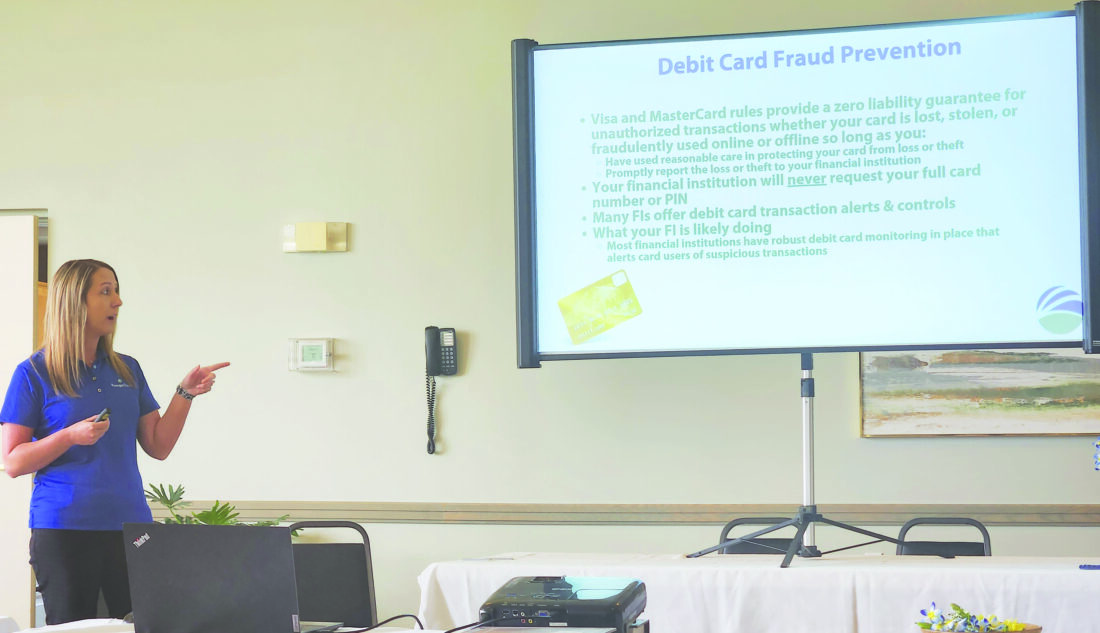“No one thinks it will happen to them “
Chamber seeks to protect local businesses

Mary Stevens/Daily Mining Gazette Rachel Simonsen of Range Bank in Marquette speaks at the anti-fraud presentation on Thursday.
HOUGHTON — The Keweenaw Peninsula Chamber of Commerce hosted a fraud education workshop for local businesses on May Thursday. The presentation, titled “Evaluating Bank Fraud: Essential Tools for Business Defense”, featured three speakers from Range Bank.
According to Rachel Simonsen, Chief Operations Officer at Range Bank in Marquette, the goal of the event was “to share some knowledge with our local businesses about what we’re seeing here in our communities, the effect [bank fraud] is having on businesses and financial institutions, because it’s been a pretty big effect.”
“We have seen an increase in fraud, especially check fraud.” said Alicia Curto, the Brand Administration Officer at Range Bank in Houghton. Simonsen added that all types of businesses are being targeted.
“It’s pretty even across the board. You’re writing checks, putting them in the mail. If you’re making payments, you’re a target.” she said.
In the presentation, Simonsen explained how a cultural shift to online payments has left defense against check fraud weakened. Scammers are able to alter and change checks, in a process called ‘whitewashing’. This allows them to cash the checks in their own name. It can take weeks for a business to realize they have been a victim of whitewashing. In 2024 alone, Range Bank assisted in 64 cases of check fraud.
The discussion also covered ACH fraud, which occurs during electronic money transfers. One attendee shared that his business had been targeted three times. “They pirated an employee’s email address,” he said. “It was pretty sophisticated.” 80% of organizations have been targeted by ACH fraud scams at some point in their existence.
Stacy Bouman, the Deposit Services Officer at Range Bank in Marquette, stressed the importance of reporting fraudulent transfer attempts immediately.
“For all intents and purposes, once [that money] is gone, it’s gone.” Bouman said.
Speakers also discussed several additional types of fraud, including digital account takeovers and wire fraud, which claims over $400 million yearly.
Many money fraud attempts share similar warning signs, regardless of what format they’re in. Red flags include messages with a sense of urgency, last minute changes to invoices, and the name and location of a transfer not matching wire instructions (i.e., being asked to wire money to an institution in a different country.)
In order to prevent fraud and protect yourself and your organization, it’s important to monitor accounts regularly. Also, call employees and organizations directly to verify information about bank changes and payment methods.
For personal protection, take advantage of the security protections offered by many banks and financial institutions. Additionally, never share bank credentials. Bouman stressed that banks will never ask for your full credit or debit card number or pin.
If you suspect you may be a victim of fraud, call your bank immediately, and notify law enforcement. Time is critical, and your bank may not be able to recover any lost funds if the fraud isn’t reported immediately.
The fraud prevention seminar will be given again online on June 3. For access to this event, contact Simonsen at 906-228-8791.






